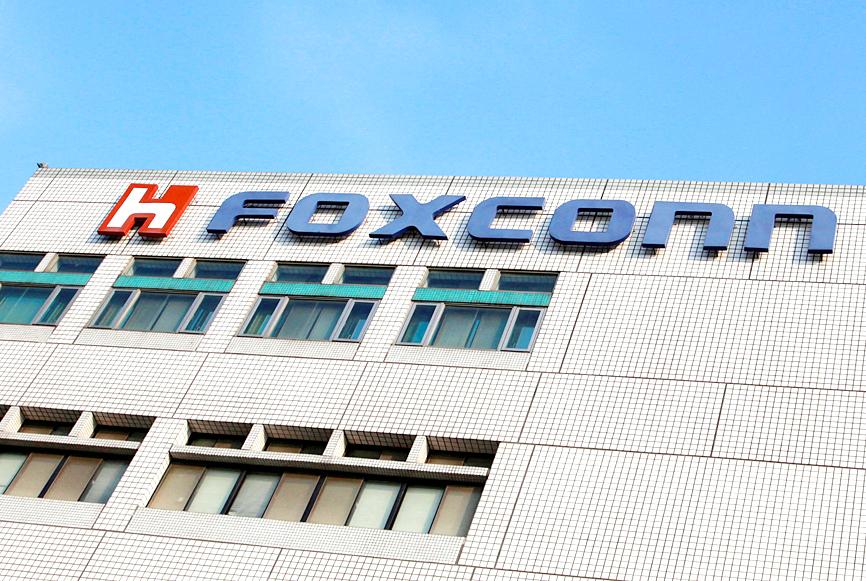Foxconn Interconnect Technology Ltd (FIT, 鴻騰精密), a subsidiary of Taiwanese manufacturing giant Hon Hai Precision Industry Co (鴻海精密), yesterday confirmed that it halted production at its factory in Kunshan, China, after employees tested positive for COVID-19.
The company, which makes electrical connectors and data transmission equipment at the Kunshan plant, said it does not expect the suspension to significantly affect the company’s ability to fill customer orders.
It confirmed the temporary closure of its production lines in Kunshan after the South China Morning Post reported earlier in the day that two Hon Hai plants in the city had been closed since Wednesday, as some of the workers had tested positive for COVID-19.

Photo: Nicky Loh, Reuters
As a result of the positive tests, all employees at the two factories have been confined to their dormitories, the report said.
Hon Hai, which is known as Foxconn Technology Group (富士康科技集團) outside of Taiwan and is a major supplier to Apple Inc, was among 60 manufacturers listed in Kunshan on Tuesday last week as “COVID-19 free” enterprises that were permitted to continue production amid a sharp increase in COVID-19 cases there.
FIT said it would have to wait for approval from authorities before resuming operations.
The company’s overseas operations are unlikely to be significantly affected, as it has assigned capacity from plants in other cities to maintain inventory levels, it said.
Although FIT’s Kunshan plant has been closed temporarily, Hon Hai’s other production facilities in the city reportedly are operating normally, analysts said.
In addition, Hon Hai’s two major plants in China — in Henan and Guangdong provinces — are still operating at full capacity, rolling out iPhones for Apple, analysts added.
In Henan, officials locked down the Zhengzhou Airport Economy Zone that hosts Hon Hai’s “iPhone City” campus on Thursday for an indefinite period, a government notice viewed by Bloomberg News said.
Residents are not allowed to leave their homes unless it is considered necessary during the lockdown, the notice said, but workers for key businesses can commute with permits.
Passenger and cargo flights to and from the central Chinese city are operating normally, the Zhengzhou Xinzheng International Airport said on Saturday in an announcement on its WeChat account.
Hon Hai relies on the airport to ship iPhones internationally.
Apple suppliers in China have been affected to varying degrees by China’s pursuit of its “zero COVID-19” policy, and the effect has remained limited, given it is traditionally the slow season and demand for consumer electronics is in a trough.
Pegatron Corp (和碩) suspended operations at its iPhone plants in Shanghai and Kunshan, while Apple laptop maker Quanta Computer Inc (廣達電腦) only recently resumed some production after halting work for a few days in Shanghai.
Additional reporting by Bloomberg

SEEKING CLARITY: Washington should not adopt measures that create uncertainties for ‘existing semiconductor investments,’ TSMC said referring to its US$165 billion in the US Taiwan Semiconductor Manufacturing Co (TSMC, 台積電) told the US that any future tariffs on Taiwanese semiconductors could reduce demand for chips and derail its pledge to increase its investment in Arizona. “New import restrictions could jeopardize current US leadership in the competitive technology industry and create uncertainties for many committed semiconductor capital projects in the US, including TSMC Arizona’s significant investment plan in Phoenix,” the chipmaker wrote in a letter to the US Department of Commerce. TSMC issued the warning in response to a solicitation for comments by the department on a possible tariff on semiconductor imports by US President Donald Trump’s

‘FAILED EXPORT CONTROLS’: Jensen Huang said that Washington should maximize the speed of AI diffusion, because not doing so would give competitors an advantage Nvidia Corp cofounder and chief executive officer Jensen Huang (黃仁勳) yesterday criticized the US government’s restrictions on exports of artificial intelligence (AI) chips to China, saying that the policy was a failure and would only spur China to accelerate AI development. The export controls gave China the spirit, motivation and government support to accelerate AI development, Huang told reporters at the Computex trade show in Taipei. The competition in China is already intense, given its strong software capabilities, extensive technology ecosystems and work efficiency, he said. “All in all, the export controls were a failure. The facts would suggest it,” he said. “The US

The government has launched a three-pronged strategy to attract local and international talent, aiming to position Taiwan as a new global hub following Nvidia Corp’s announcement that it has chosen Taipei as the site of its Taiwan headquarters. Nvidia cofounder and CEO Jensen Huang (黃仁勳) on Monday last week announced during his keynote speech at the Computex trade show in Taipei that the Nvidia Constellation, the company’s planned Taiwan headquarters, would be located in the Beitou-Shilin Technology Park (北投士林科技園區) in Taipei. Huang’s decision to establish a base in Taiwan is “primarily due to Taiwan’s talent pool and its strength in the semiconductor

French President Emmanuel Macron has expressed gratitude to Hon Hai Precision Industry Co (鴻海精密) for its plan to invest approximately 250 million euros (US$278 million) in a joint venture in France focused on the semiconductor and space industries. On his official X account on Tuesday, Macron thanked Hon Hai, also known globally as Foxconn Technology Group (富士康科技集團), for its investment projects announced at Choose France, a flagship economic summit held on Monday to attract foreign investment. In the post, Macron included a GIF displaying the national flag of the Republic of China (Taiwan), as he did for other foreign investors, including China-based